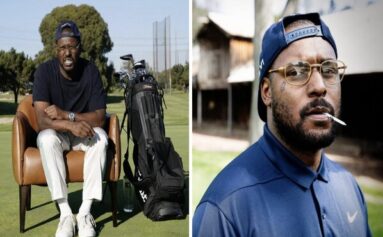It remarkably started with a bet in 2009.
Sarah Piampiano ( who has a litany of nicknames including Little Red, Piamps, Pimp, Piano, Pom Pom, Lil P, Gimpy/ Gimpster) was out with an old college buddy, winding down from a long week of work as a Wall Street investment banker.
Somehow, as she gulped down another potentially liver-debilitating alcoholic beverage and partied into the wee hours of the morning with her carcinogen-infested cigarette smoke doing somersaults in the air, the subject of triathlons entered the conversation.
Triathlons are grueling, multiple-stage competitions involving the completion of three continuous endurance disciplines; running, swimming and cycling. Triathlons are hardly for people who spend their free time inhaling smoke and tossing back Jack Daniels, unless you’re Piampiano, who in 2014 is considered one of the world’s rising forces in Ironman events.
Her journey was inspired by a bet, but was ultimately driven by a childhood passion to become a pro athlete and a desire to live a happier, healthier and more balanced lifestyle.
The Shadow League spoke with Lil P about her passionate, personal transformation and inspirational story.
SARAH PIAMPIANO: I used to live in New York City and I worked in banking and worked for one of the big firms (HSBC). I was smoking two packs of cigarettes a day and generally leading an unhealthy lifestyle. I went out one night with my friend and he said he had signed up for this triathlon.
We were always kind of in semi-competition and I said I could beat him and we ended up making this bet and that’s how it all started for me. I ended up going and doing the race and I beat him, but in the process for me it was more about the experience and I just felt really inspired and motivated by not just completing the race, but the community and the people that were there supporting us at the event.
I did another race maybe five months later and I actually won the race and at that point I got this bee in my bonnet that I if I train harder I can start taking this more seriously, and kind of took it from there.
What has now become known as “The Bet,” and the improbable journey that followed, didn’t happen by magic. It was more like divine intervention. Piampiano’s foundation was built upon excelling and setting lofty goals. She was searching for that personal satisfaction athletic competition feeds – a far different high than working in the high-stakes, unpredictable New York City corporate rat race.
S. PIAMPIANO: I grew up with two older brothers who wouldn’t let me play with them if I wasn’t as good, so I’ve always been active and competitive and having this dream of being a professional athlete and going to the Olympics. I was a really competitive athlete growing up in Cumberland, Maine. I was a nationally–ranked runner and I also was big into downhill ski racing. So when I was in high school I had to make the decision of focusing my energies on ski racing or running and I chose ski racing. I went to a special high school that is completely focused on trying to get people on the national team and put them into the Olympics and things like that.
It didn’t happen for me, so you kind of continue on with your life. You go to college and after college you get a job. When triathlon came into the picture and I realized I had potential, it just sort of brought back all of the motivation and energy and desire to try to compete on a professional level. The same drive I had when I was younger.
I was working between 100-120 hours a week, which is a lot, and when I decided to take triathlon competition a bit more seriously I approached my bosses at HSBC and said, ‘You know, I think I have a really good chance to do triathlons professionally and I’d like to have the opportunity to see if it’s a realistic goal or not. I was wondering if you’d be willing to support me in that?’
In 2011, a 30-year-old Sarah marched arduously towards her dream, began working just 40 hours per week and cut her business travel significantly, which provided her the opportunity to figure out if she would pursue triathlon full-time or not.
S. PIAMPIANO: So I essentially only worked four days a week. My bosses gave me that opportunity to just train and go and really put my head down and focus on triathlon and that year I was still competing as an amateur, but I went out and won almost every single race. And then I went to the World Championships in Kona, Hawaii and I was the top American amateur there (Amateur athletes qualify for the championship by receiving slots allocated to each age group's top finishers in a qualifying event.)
At that point I decided to start racing professionally. It became a full-time job. At the end of 2011 I left my job and I ended up moving from NYC out to Los Angeles, California to go and train with world renowned open water swim coach Gerry Rodriguez, who runs a program called “Tower 26”.
This is my third year racing professionally, but last year I went and raced at Iron Man Austria. I've raced in Europe, Austria, and Chile a couple of times. I’ve raced in Mexico and Canada.
Piampiano recaptured her dream. She was lucky enough to find that long lost puppy most people stop looking for after awhile. Her Wall Street gig provided her with an extensive travel schedule, but boring conferences and schmoozing numbers with tight shirts can’t compare to the thrill and challenge of swimming in the bay of Kailua-Kona, or cycling across the Hawaiian lava, or pushing yourself through a marathon run along the coast (from Keauhou to Keahole Point and back to Kailua-Kona); finishing on Alii Drive. And Piampiano declares that the work it takes to get there is well worth it.
S. PIAMPIANO: One of my fondest memories is completing in my very first Ironman, because it’s not just a physical commitment that you make; there’s also a huge emotional and mental commitment. You’re out there and you’re racing for a long time — well for me in my first one — I finished in 10 hours. It’s just a really long day and you’re tired and you're hungry and your body is just moving for 10 hours, not to mention the fact that you’ve been up since like 4 o’clock in the morning.
So my first Ironman in Cortland, Idaho was really special for me. It was one of the highlights of my entire career and I was racing as an amateur. I’d say another highlight was actually racing in Austria last year. In Europe, triathlon is huge and there will be crowds of 300,000 to 400,000 people that come out to watch the race and it’s just this really motivating experience. Like during the bike (part) in the Tour De France, they’ve got just crowds of people on the side of the road cheering you on and everybody’s really into it. When you finish the race, there’s thousands and thousands and thousands of people cheering you on. It’s just an energizing environment.
There are over two dozen Ironman Triathlon races throughout the world that enable qualification for the Ironman World Championships. Professional athletes qualify for the championship through a point ranking system, where points are earned based on their final placement in Ironman and Ironman 70.3 events.
Being called a “triple threat” is a huge compliment in most other sports, but in triathlon possessing a multitude of all-world skills is the basics.
S. PIAMPIANO: My background is in running so usually running is my best event, but actually my ski racing background has translated very well for me in cycling, so I’m actually probably one of the top cyclists in the sport right now. Earlier this year I broke the bike course record at a race and the previous course record was held by a woman who had won a bronze medal in the Olympics in cycling. So definitely cycling is a big strength as well. I’m a much weaker swimmer, so I definitely need to make up for it with the bike and the run.
Getting to this point wasn’t easy for Piampiano and has taken a total lifestyle transformation to accomplish. For one, her finance job was a lot more glamorous and the perks more immediate. She broke it down like a James Brown bridge in the May 2013 issue of Triathlete.
S. PIAMPIANO: Oh man. It’s so different. It’s like night and day. On an average trip in my finance job I flew business class. I stayed in five star hotels with all the amenities I could possibly want. I had an expense account so I could eat out at nice restaurants. Most recently, on my trip to Pucón, I flew coach and I stayed in a hostel where I spent $90 for six nights. I went to the grocery store and bought food so that I wouldn’t have to eat out. It’s a completely different world for me. But in a lot of ways it enhances the experience. You’re not afforded these luxuries, but you meet different people and it creates opportunities that you wouldn’t have otherwise. But there I was in Pucón nibbling on my carrots…
For the young lady who loves her cheeseburgers, pizza and Dairy Queen, becoming a health nut wasn’t an easy transition, but it was a necessary one.
S. PIAMPIANO: Now, normally I’m in bed at 8:30 pm and on a strict diet trying to eat as clean and healthy as possible and I definitely have to limit my social time. There are a lot of sacrifices you make to compete at this level.
I was really leading a very unhealthy lifestyle. I had no balance in my life and pretty much all I did was work and if I wasn’t working I was going out and I was partying or I was smoking. I wasn’t eating well and I wasn’t sleeping much .
Not everybody’s going to go from being a two-pack-a day smoker to a professional athlete, but I think there’s something to be said for finding something that really inspires you and motivates you to start leading a more balanced and healthy life. Maybe it motivates you to start eating better or exercise more. Or maybe it motivates you to spend more time with your family; whatever creates more balance in your life. I think it’s something we all can relate too because we all struggle with it.
Piampiano’s career switch hasn’t come without its setbacks. She has champagne dreams, but a leg injury currently has her thirsty for the taste of competition.
S. PIAMPIANO: I broke my leg in May and I have and will be out of commission for a while. It happened just running, pretty much. I got a stress fracture in my femur. I’m actually still on crutches. Unfortunately it put a big damper on my season. I qualified for the World Championships this year but I had to withdraw from racing in them because I won’t be recovered in time.The Ironman World Championship in Kona, Hawaii is like the 'Holy Grail' of Ironman distance racing, and my goal is to try and win that in the next two years. I have a lot of work to do and it’s becoming more and more competitive, but that’s what I want to achieve.
But you know it’s all a part of the process and there have been a lot of good things that have come of it. Talking about balance, even though I haven’t really enjoyed being injured I’ve completely embraced the time off and just really tried to live kind of like a normal person for the last two months. I’ve tried to embrace the opportunity to hang out with my friends and family which is something I don’t normally get to do.
The cast gets removed next week and "Pimp" is aiming to begin her season in October. It's been tough, but she hasn't spent her down time second-guessing decisions or wallowing in misery. She’s using it to inspire people with bad habits to shake them and replace them with something more fulfilling and life-enhancing.
S. PIAMPIANO: I think it’s definitely a story a lot of people can relate too and actually with that, I’m in the process right now of building a website called Thehabitproject.com. The whole purpose of that is to leverage my story and what I’ve achieved and use it as a platform to help inspire and motivate and try to help create social movements geared towards breaking bad habits.
One of her targets is smoking, which Piampiano no longer indulges in. Tobacco use is the leading preventable cause of death and worldwide it causes more than 5 million deaths per year. Current trends show that tobacco use will cause more than 8 million deaths annually by 2030.
S. PIAMPIANO: It’s tough because I came from a really athletic background and then started smoking. I knew it wasn’t a healthy habit but there was nothing inspiring me to make a change. Triathlon, if nothing else, has inspired me to change, be a better person and bring more balance into my life. I don’t know what that's going to be for each person, but there’s going to be something that pushes you. Your job is to figure out what that is and run with it.
Whether or not Piampiano captures her championship dream is secondary to the fact that she’s finally chilling in a state of steady equilibrium. Being a professional triathlete – the highs and lows – have blessed her with that gift.



